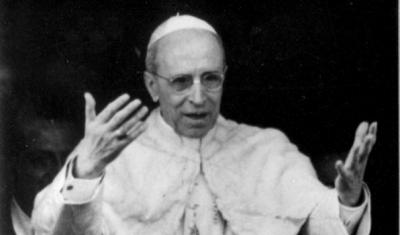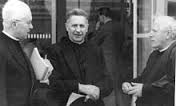Book review: Insights into a festering papal enigma
Desmond O'Grady
|
19 October 2015

Pope Pius XII
ROME - The Pius XII issue still festers -- is he to be condemned for not speaking out against the Nazis' persecution of the Jews? Pope Francis has said that reading unjust criticisms of Pius gives him a rash. There are some in the Church who want Pius declared a saint in response to the criticism but that is not imminent.
Immediately after World War II Pius was honoured by all. The wartime chief Rabbi of Rome, Israel Zolli, converted to Catholicism and took as his first name Eugenio from the Christian name of Pius XII ( Eugenio Pacelli). Thomas Mann, the German novelist, described himself as 'the unbeliever and heir of Protestant culture' who, on meeting Pius '…kissed the ring of the Fisherman (who)… represented 2000 years of Western history.' A Jewish author Rabbi Pinchas Lapide calculated that during World War II Catholics saved at least 700,000 Jews and Albert Einstein wrote of his new-found respect for Catholicism because of its opposition to Hitler.
However Pius the hero became Pius the coward after the German playwright Rolf Hochhuth in 'The Deputy' (1963) denounced him for not publicly condemning the Holocaust. Badmouthing Pius was boosted by John Cornwell's book 'Hitler's Pope' ( 1999 ) which claimed that, as the Vatican's diplomatic representative in Germany, Pius had fatally weakened the opposition to the Nazis by his vital contribution to an agreement, a Concordat, with the regime. Those who defend Pius say that for the Vatican this was not so much support of the regime as defence of certain Catholic rights.
Before his election as Pope in 1939 Pius had spent years in Germany as a Vatican representative, his lifelong de facto personal secretary was a German nun Mother Pacalina, he spoke German in the Vatican. He loved Germany but not the Nazis.
His diplomatic background influenced him as pope. A pope such as the Polish Saint John Paul II, who allegedly said he would confront Soviet tanks if they invaded Poland, might have reacted differently from Pius if he had been pope during World War II.
The Vatican defence of Pius has been that he was aware that public protests would have made him look good but would not have aided the Jews. They would have been mere grandstanding. Support for this viewpoint comes from episodes such as the Dutch bishops' public denunciation of anti-Semitism, which was followed by Nazis bursting into monasteries and convents to seize Jews hidden there, and the deportation of 40,000 Dutch Jews which could be a precedent for the Nazis entering religious institutions in Rome where thousands of Jews were hidden, some hundreds of them in the pope's summer residence.
Moreover the Polish bishops begged Pius not to denounce anti-Catholic measures because it would only cause their intensification. Pius used information from Poland about persecution to rebuke the German Foreign Minister, Franz von Ribbentrop, but publicly was silent.
Mark Riebling, an American expert on intelligence operations, argues that Pius covertly backed the German resistance to Hitler and guaranteed its credibility with the British who responded cautiously. He introduces a new factor regarding Pius' silence. He says that he committed to the anti-Hitler plotters at the time (October 1939 ) he issued his first encyclical letter, and in it ceded to their plea not to specifically condemn the Nazis as this would make them intensify their surveillance. The encyclical was the last time for the duration that he used the word Jew when defending human rights. Instead he confined himself to proclaiming principles.
Initially Pius hoped the plotters' plans to overthrow Hitler would avoid the outbreak of war and, when this did not happen, that it would obtain an early peace.
The Nazis had spies in the Vatican as well as the Vatican having informers in Germany. Pius used a German Jesuit in Rome who was not formally part of the Vatican for many of the contacts with the German counterparts, some of which took place in the excavations for the tomb of St. Peter under the basilica. Hitler suspected Pius's role and planned to kidnap him but an Italian General tipped off the Vatican and the plan was foiled. A one-page document which was proof of Pius' role was consigned in Rome to a resistance leader, Josef Muller, with instructions to destroy it eventually. Instead he used it to convince the anti-Hitler German military of Vatican support and later it was produced when he was under interrogation. His interrogator must have been a sympathiser, however, because he left Muller alone in the room for some minutes. He took the document and ate it
There are similar episodes in the book which moves as swiftly as a novel and concerns mainly those Germans who hoped to show the world there was a 'decent Germany.' Two figures stand out: the already- mentioned convivial lawyer-politician Josef Muller and the head of the Jesuits in Northern Germany, energetic Augustin Rosch. Both were based in Munich and both had been decorated with the Iron Cross for bravery in World War I. They worked to build a resistance movement in schools and trade unions which could provide a basis for an uprising and a new Germany.
Rosch had been battling against Hitler's police, the Gestapo, to protect Church rights since well before World War II and, through his friend Muller, sent reports to the Vatican. Pius feared that his diplomatic representative in Berlin was soft on the Nazis and, moreover, there were moles within the German Bishops Conference whose behind-door discussions were leaked to the Nazis. However he trusted the Jesuits and the Dominicans who formed an Intelligence Committee. Its driving force, Rosch, linked up with the military intelligence unit, Abwehr, headed by Admiral Wilhelm Canaris who considered Hitler a criminal as did other key officers of the traditional armed forces. Rosch had contacts in unexpected places: Hans Rattenberg, commandant of Hitler's personal bodyguard, admired him because he had seen him courageously survive an interrogation by the head of Hitler's police, Heinrich Himmler.
The plotters organized several attempts on Hitler's life which were foiled, sometimes because of his tactic of changing plans such as shifting a conference site from a concrete bunker to a wooden barracks. This had occurred just before a mutilated war hero, Claus von Stauffenberg, planted a briefcase with a bomb next to Hitler under a table during a General Staff conference on 20 July 1944. Its explosion, which killed eight, left Hitler stunned but unscathed. The wood building collapsed allowing the explosive force to disperse whereas a concrete bunker would have compressed it.
Indirectly Riebling's well-documented book, with its 72 pages of source notes, is a response to the critics of Pius XII but probably will not silence all those convinced his silence was guilty.
Church of Spies
Mark Riebling
Basic Books

Fr Augustin Rosch (centre), head of the Jesuits in northern Germany


